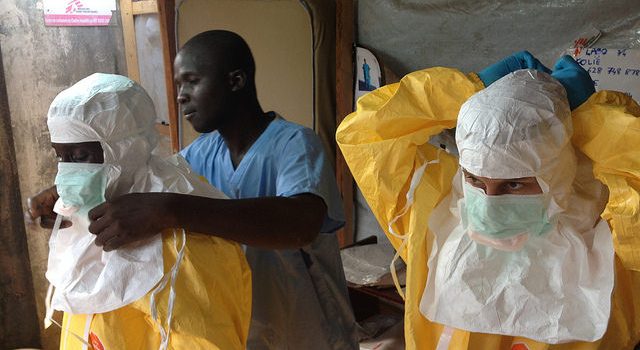by Margaret E. Kruk, Associate Professor, Columbia University Mailman School of Public Health
“Fear of Ebola breeds a terror of physicians” proclaimed an article in the New York Times recently, observing that sick people in rural areas were more comfortable with seeking help from traditional healers than health system workers. Panicked citizens in Monrovia’s West Point slum overran health centers, looting equipment and demanding that a clinic for Ebola victims be shut down. This reaction is a product of misinformation about the role of health workers in spreading disease and despair about the absence of a cure, but also reflects a deeper lack of confidence in the country’s health system.
In a recent paper, “Can the health system deliver? Determinants of rural Liberians’ confidence in health care”, my colleagues Theodore Svoronos and Rose Jallah Macauley, and I, wrote about the results of a 2008 community survey we conducted in Nimba County — a rural area ravaged by war, north of Monrovia — and one of the areas currently affected by the Ebola outbreak. The survey was designed in collaboration with the Ministry of Health and Social Welfare, which was interested in gaining feedback from the population on its reconstruction of the health system.
In the survey, we asked about villagers’ use of health care and their expectations of the health system. One of the questions was: ‘If you or your child is very sick tomorrow, can you get the health care you need?”— a measure of confidence in the health system’s emergency response capacity. Measuring confidence in health care matters because the health system is a core part of the social safety net so this gives important feedback to policymakers. Confidence in the system may also encourage people to seek care for life-saving services in future — such as in an epidemic outbreak.
In our study we found that only half of the 1434 respondents (men and women over age 18) reported being confident that the health system can respond if they or their child became very ill. People with past trauma exposure in the war — exceedingly common in Liberia — had lower levels of trust in the system as did people who frequently visited traditional healers. Men and women with some education were more likely to have faith in the system compared to those without any education, perhaps because they understood better the value of formal health care and were able to search out effective services.
We also found that people who were dissatisfied with their last visit to a health clinic had lower confidence in the capacity of the health system to respond to serious illness — even if their clinic was relatively nearby and had a modicum of staff and functioning equipment. In other words, confidence was born of the care experience and not the typical markers of health care coverage — distance to users and supply of equipment.
How does this apply to the current Ebola crisis? For one, it may explain the population’s reluctance to seek care from doctors and nurses. The Liberian population has been traumatized by 14 years of civil war and most people have only experienced the most basic health services, typically in rudimentary facilities. A young mother with a raging fever may simply not have the foundation of trust in health care to propel her to seek help from her local clinic. And she will have no trust in the care offered by foreigners in white space suits.
These findings are also a powerful reminder that any health system has to demonstrate its usefulness to people to be valued and trusted in emergencies. This is best achieved when trained health professionals provide effective and respectful care reliably to people for all manner of conditions — a process that takes time. It is these patient-clinician interactions rather than buildings or supplies that are the building blocks of population confidence in health care.
Investing in high quality routine services — and assessing whether these meet people’s expectations — should be core tasks for any health system that hopes to mount an effective response to a future pandemic.











